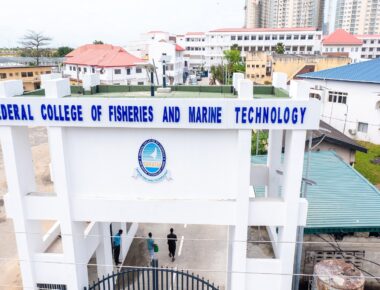
A high-stakes battle for control over the Federal College of Fisheries and Marine Technology and the Nigerian Institute for Oceanography and Marine Research (NIOMR) has set the Ministry of Marine and Blue Economy on a collision course with the Ministry of Agriculture, findings by Shipping Position Daily have revealed.
Recall that since their inception, these institutes have operated under the authority of the Ministry of Agriculture. However, the recent creation of the Ministry of Marine and Blue Economy has ignited a fierce battle over jurisdiction, with tensions escalating as both ministries now vie for control.
Sources familiar with the matter have disclosed that while plans are underway to transfer control of these institutions to the newly-created ministry, the Ministry of Agriculture has been placing bureaucratic roadblocks to maintain its grip on them.
“The Ministry of Marine and Blue Economy has a legitimate claim,” said an insider with knowledge of the ongoing discussions, who spoke on the condition of anonymity.
“These institutes are vital for the blue economy, but the Ministry of Agriculture doesn’t want to lose control. They’re throwing up all sorts of bottlenecks to delay the process.”
The Federal College of Fisheries and Marine Technology and NIOMR have played crucial roles in advancing fisheries, oceanography, and marine research in Nigeria. Traditionally overseen by the Ministry of Agriculture, their work has primarily focused on supporting the country’s agricultural policies, particularly in aquaculture and sustainable fisheries development.
However, with the establishment of the Ministry of Marine and Blue Economy, many stakeholders believed that the natural next step would be to transfer these institutes to the new ministry, which is specifically tasked with overseeing Nigeria’s vast marine and blue economy resources.
Although the Ministry of Marine and Blue Economy, under the leadership of Mr. Adegboyega Oyetola, has been vocal about its desire to gain control of these institutes, arguing that they are central to its mandate. “Both the Federal College of Fisheries and NIOMR are fundamental to the growth of Nigeria’s blue economy,” an official from the Marine and Blue Economy Ministry told Shipping Position Daily. “Their work is directly tied to the maritime sector, and keeping them under the Ministry of Agriculture makes no sense. It’s like trying to farm fish on dry land.”
Despite these arguments, there are allegations that the Ministry of Agriculture has resisted the transfer, clinging to the institutes with claims that their missions remain integral to the country’s agricultural development strategy.
Our correspondent gathered that the agriculture ministry has been slow to act on the proposed transfer, delaying the handover through what some observers have described as deliberate bureaucratic tactics.
Officials within the Ministry of Agriculture have reportedly expressed concerns about the potential loss of two institutions that contribute significantly to its aquaculture and marine resource management projects. One source within the Ministry of Agriculture, who declined to be named, told Shipping Position Daily that they are fighting to keep the institutes under their control for several reasons.
“NIOMR and the College of Fisheries are not just about marine research—they support our food security agenda. They are essential to aquaculture and other agricultural policies that help feed the nation,” the source said. “We believe it is premature to remove them from the Ministry of Agriculture, especially when their work is so closely aligned with what we are doing.”
Insiders, however, argue that this reasoning is part of a calculated attempt to maintain control over valuable institutions, even at the expense of broader national interest. The Ministry of Marine and Blue Economy, they argue, is better positioned to handle these institutes, given the synergies between their research and the ministry’s mandate.
Our correspondent learned that the bureaucratic hurdles imposed by the Ministry of Agriculture have reportedly slowed progress on the handover, leaving the two institutes in a state of limbo.
According to sources within the Marine and Blue Economy Ministry, efforts to transfer control of the Federal College of Fisheries and NIOMR have faced constant delays, with officials in the Agriculture Ministry insisting on extensive reviews and consultations before any formal decision can be made.
Commenting on the matter, Mr. Sesan Ajayi, Chairman of the Nigerian Chapter of the Institute of Chartered Shipbrokers, emphasized the need for NIOMR to be under the Ministry of Marine and Blue Economy.
“The institute is supposed to be under the Ministry of Marine and Blue Economy, because of the pivotal role of research, development, and innovation that has to do with the sustainability of marine life, marine water bodies, and both the offshore and onshore aspects of the blue economy. Before we start making money from marine life, we need to develop it, and that requires focus,” he stated.
Reflecting on NIOMR’s past under the Ministry of Agriculture, Ajayi noted that while the Ministry of Agriculture had helped the institute conduct necessary research, transferring it to the Ministry of Marine and Blue Economy would provide the needed focus to enhance Nigeria’s GDP from marine resources. “In the past, marine statistics weren’t properly captured, but now under the Marine and Blue Economy Ministry, we can better monitor and plan for the sector’s future.”
Ajayi further emphasized the richness of Nigeria’s coastal life and the importance of developing coastal economies to generate employment opportunities, urging for better localization of each coastal community’s comparative advantage. On the issue of foreign poaching of Nigeria’s marine resources, he lauded the Federal Government’s efforts in securing the waters and praised NIMASA and the Navy for their work in reducing piracy in the Gulf of Guinea.
Despite the ongoing stand-off, there are hopes that a resolution could be reached in the coming months. According to sources, negotiations are continuing behind closed doors, with both ministries working to find a compromise that would allow the institutes to transition smoothly into the Marine and Blue Economy Ministry without disrupting their ongoing projects.















